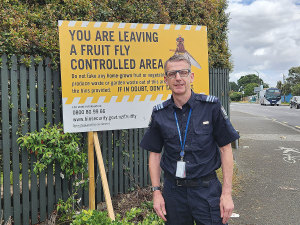Horticulture NZ Celebrates Record Year for Kiwifruit and Apples
Reflecting on the past year, Horticulture New Zealand chief executive Kate Scott says there has been a lot to celebrate.
 Mike Inglis, Biosecurity New Zealand commissioner, north, says about 150 staff are working on the response.
Mike Inglis, Biosecurity New Zealand commissioner, north, says about 150 staff are working on the response.
Horticulture New Zealand says an outbreak of fruit fly could have significant impacts for the horticulture sector.
Kate Scott, chief executive of HortNZ, says immediate impacts may include restrictions on the movement of fresh produce from affected areas, increased compliance requirements, and potential market access challenges for exporters.
“It would affect growers’ livelihoods, disrupt domestic and international supply chains, and require extensive eradication efforts. That’s why early detection and a rapid response are critical,” Scott told Rural News.
Her comments follow the discovery of an Oriental fruit fly in the Mangere/Papatoetoe area of Auckland earlier this month.
The discovery led to a Controlled Area Notice being placed on the area and increased trapping.
At the time of writing, no further fruit flies had been found in the area.
“New Zealand has a world-class biosecurity system, and previous responses have successfully eradicated fruit fly incursions before they could establish,” Scott says.
“Protecting the horticulture sector from biosecurity threats like the fruit fly is critical to the country’s economy and reputation as a producer of high-quality produce,” she adds.
HortNZ is working with Biosecurity New Zealand and directly involved in decision-making and response efforts.
“Our priority is to support the response and ensure that growers have the latest information,” Scott says.
Mike Inglis, Biosecurity New Zealand commissioner, north, says the Ministry for Primary Industries (MPI) has more than 150 staff working on the response, including a large on the ground presence.
“Our staff have been out and about putting in extra fruit fly traps and upping checks of them, collecting fruit samples for checking at our mobile laboratory, and providing information to residents and visiting businesses in the area to explain what the restrictions mean for them,” Inglis told Rural News.
“Residents in the two zones are being asked to put fruit and vegetable waste into the special response bins for Biosecurity New Zealand to dispose of securely,” Inglis explains. “Every household in Zone A has a bin, and in Zone B, bins are placed around the edge of the zone, primarily on major transport routes, plus additional bins within the zone.
“We want to thank the local community for their positive response to our team so far,” he says.
Inglis says Biosecurity New Zealand has various measures in place to keep out the 20 fruit fly species considered to be serious pests, including strict import health standards and thorough checks of imports and passengers and their luggage arriving in New Zealand.
“However, we know that fruit flies can still accidentally be brought in by passengers arriving from overseas and on imported fruit and vegetables,” he says.
MPI has information about the restrictions imposed on the two zones, translated into multiple languages at https://www.mpi.govt.nz/fruitfly.
Fonterra’s impending exit from the Australian dairy industry is a major event but the story doesn’t change too much for farmers.
Expect greater collaboration between Massey University’s school of Agriculture and Environment and Ireland’s leading agriculture university, the University College of Dublin (UCD), in the future.
A partnership between Torere Macadamias Ltd and the Riddet Institute aims to unlock value from macadamia nuts while growing the next generation of Māori agribusiness researchers.
A new partnership between Dairy Women’s Network (DWN) and NZAgbiz aims to make evidence-based calf rearing practices accessible to all farm teams.
Despite some trying circumstances recently, the cherry season looks set to emerge on top of things.
Changed logos on shirts otherwise it will be business as usual when Fonterra’s consumer and related businesses are expected to change hands next month.

OPINION: Here w go: the election date is set for November 7 and the politicians are out of the gate…
OPINION: ECan data was released a few days ago showing Canterbury farmers have made “giant strides on environmental performance”.